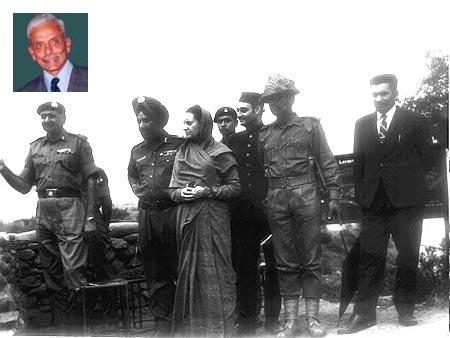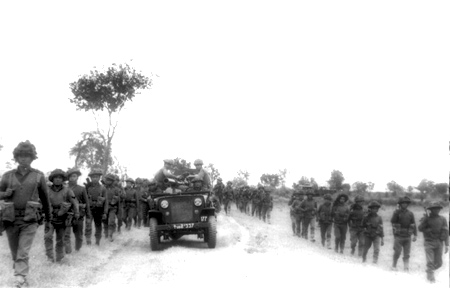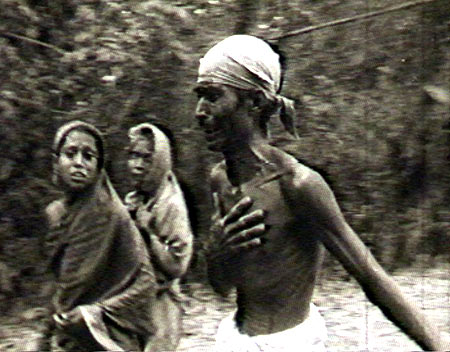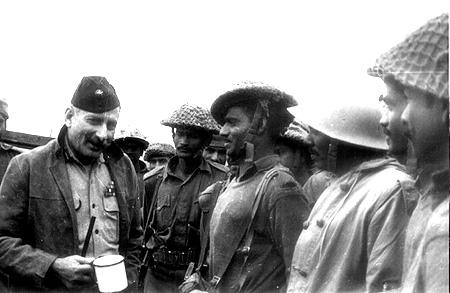
War Hero Major General Ian Cardozo (retd)was wounded in the battle of Sylhet in Bangladesh in the 1971 war with Pakistan.
He lost his leg in a landmine blast, but conquered his disability and went became the first disabled officer in the Indian Army to command an infantry battalion and then a brigade.
Awarded a Sena Medal for gallantry, General Cardozo is presently Chairman of the Rehabilitation Council of India and has authored The Sinking of INS Khukri -- Survivors Stories and Param Vir -- Our Heroes In Battle.
In conversation with Claude Arpi, the general looks back at the war where more than 93,000 Pakistani prisoners were taken, a region was liberated and a new nation born.
A young major 40 years ago, he recounts the heroic battles fought by the Fifth Gorkha Rifles in the Eastern theatre, where he and a brave band of men played a pivotal role in the defeat of Pakistan.
We are celebrating 40 years of the most resounding victory of the Indian armed forces, tell us about your involvement in the 1971 Operations and the role of your battalion, the Fifth Gorkha Rifles.
I was in the Staff College doing a course. My battalion was already on the front. The second-in-command (known as '2IC') of the battalion had been killed; the army had to replace him.
They looked around and found this guy (then Major Cardozo) in the Staff College. My posting was cancelled and I was sent to the front.
I was permitted to drop my family back home (my wife and three sons). I returned to Delhi by train on December 3.
The war had already started, but we did not know, though we heard aircraft flying above us. In Delhi there was a blackout. Next morning, I went to Palam airport to catch the plane to Assam, but it was cancelled: it would have been a lovely target.
I jumped into a taxi, rushed to the railway station. The train was moving out of the platform, I managed to pull the chain and board it. The next night we reached a place called Dharmanagar. We have a wonderful system in the army of contractors. Over 150 years the same family of banias have served particular units in the army. One of them was there to meet me.
He said: 'Sahib, the hospital train is coming. Wounded officers from our unit are on that train, you should meet them.' I met four young badly wounded officers and then jumped into a jeep and drove night and day to reach my battalion.
Please

I had to reach in time because the Fifth Gorkhas were part of a heliborne operation and the CO (Commanding Officer of colonel rank) was waiting for me. We had to go inside Bangladesh.
I reached the place at 3 am in the morning. Four helicopters were already waiting and four others were on their way back (from Bangladesh).
There were three persons standing there. As I reached, one of them said: 'Who is there? Who are you?' I replied: 'I am Major Cardozo, Sir.' He said: 'I am General (Krishna) Rao (later, the chief of the army staff].' The other two were my brigade commander and an officer from the Corps of Engineers. They said: 'Well done, you came on time.'
The helicopters were bringing the wounded back. It was the first time in the history of the Indian Army that we were going to launch a heliborne operation.
At the Staff College, when you plan an operation like this, it takes two or three days for the army and air force officers to sit together and discuss all the details (routes, arms and ammunitions available, etc.).
In this case at 9 am the battalion was told, 'You are leaving this afternoon at 2:30 pm; you should make your plans. There is a recee at 10 am.'
To go back in time, we had earlier launched an operation for the capture of a battalion at Atgram. Normally, a brigade (about 3,000 soldiers) captures a battalion (about 750 soldiers).
In this case, a battalion was given the task to capture a battalion and this without artillery fire. Normally with the artillery to pulverise the enemy, he is forced to keep his head down, then one can attack.
My CO questioned: 'How can I capture a battalion with my battalion without artillery?' He was told: 'You have no option, just do it. The Americans and the Chinese want to come in; we have to wrap up the operations.'
The CO requested: 'I want two nights for the recee.'
Please

The first night we contacted the Mukti Bahini (the Bangladeshi freedom fighters), and went in with them shouting 'Jai Bangla. Jai Bangla.' The Pakistani forces opened fire.
We were able to locate where their LMG (Light Machine Guns) were. With the light of the firing we also saw their mortars. We repeated the same tactic the next night, and there was less fire with the enemy forces less alert.
The following night was chosen for the attack. The CO instructed us: 'We will go for a khukri (the Gorkha knife) attack. We will use only khukris and grenades. You go into the field, reach the bunkers, throw the grenades in and then use your khukris.'
Two young officers with a lot of josh (enthusiasm) did not follow the CO's instructions. They rushed directly into the bunkers and both were killed: A second lieutenant and a captain. But 32 enemy heads were chopped off.
The CO came and saw many bodies on the ground, but he did not realise that the Pakistani senior company commander was playing dead. When he came close to him, the Pakistani officer shot at the CO. They rolled on the floor grapping with each other. The Gorkhas did not know what to do for sometime, but they finally managed to kill the Pakistani officer.
This was the battle of Atgram in which we lost two officers, three JCO (Junior Commissioned Officers) and 3 ORs (Other Ranks). It is very little compared to the number who could have been killed without the cover of artillery fire.
Then (Lieutenant General] Sagat Singh (commanding 4 Corps) who was one of our most dynamic commanders ordered: 'Send the Fifth Gorkha to Ghazipur.' Why? Because an earlier battalion had been sent and it had failed, a second one went and failed.
Sagat Singh said: '5 Gorkha will do it.' We had already had so many casualties, our 2IC had been killed, many jawans were dead and the CO felt that we should be given a break; Sagat Singh said 'No.'
The Indian Army had not initially planned for the capture of Dhaka. But things changed as the operations went on. We had a very good strategy of bypassing the enemy's strong points and advancing along the weaker ones. The capture of Dhaka thus became a possibility.
Sagat Singh said: 'I want to be there first in Dhaka.' But Sylhet had to be captured before that.
How to get there? 'By helicopter', was the answer.
Who will go? The 4/5 Gorkha battalion.
My CO tried to plead: 'I have already lost so many officers (killed or wounded)'. Sagat Singh ordered: 'You will go. The Pakistani 202 Brigade was there, but they have now gone to Dhaka. There are only 200 or 300 'irregulars' (rakazars) there, what is the problem?' At that time, we had a strength 480 men only.
Please

On December 7, a helicopter with the brigade commander went in for a recee, and they came back saying that there was no opposition, no firing. They thought that the corps commander was right, nobody was there.
The officers were told to 'get ready.' We had no time for plans, no time for strategy. The orders were just 'Capture the area, go on the ground and keep expanding.'
When the first sorties left for Sylhet, we discovered there was tremendous opposition. We did not know it till later, but 202 Brigade was still there; they had not gone to Dhaka.
Though we saw a lot of artillery fire, we thought it must be a battalion; we did not realise it was a brigade.
I went in the last sortie. My company 'johnnies' (soldiers) could not say my name 'Cardozo.' They called me 'Cartoos sahib' (in Hindi, 'cartridge').
When the helicopters landed, they went from helicopter to helicopter till they found me, and fired in the air with satisfaction.
The boys were not worried (about the enemy fire). They put me on their shoulders and shouted: 'Cartoos sahib has come, he is now with us, we can go.' I went to meet the CO who was also happy that I had reached.
We started fighting and after some time, we managed to get an area of 1000 metres by 1500 metres. The CO had told us there would be a link-up in 48 hours. For para-commandos, a link-up must be done within 48 hours or they are finished.
We had no food. We had only ammunition, grenades, one handful of shakarparas (sweet wheat balls), one bandage, one bottle of water and a barsatti to sleep on the ground.
No blanket, no clothes, no shoes, nothing else.
At that time, the war was covered by the BBC, Akashvani (All India Radio) and Pakistan Radio. Nobody believed Pakistani Radio. All India Radio was always giving news two days late, because they had to get the clearance from army headquarters. But the BBC gave news on the spot. They had very committed war correspondents and had got the permission to cover the operations.
We all listened to the BBC. That day we heard: 'A brigade of Gorkhas has landed at Sylhet.'
I told my CO: 'Sir, the Pakistanis are listening to the BBC, we are listening to the BBC, they have more than a battalion, so let us keep pretending that we are a brigade and let us deploy as a brigade.'
Please

There was a risk: They could have taken us apart bit by bit. We took the risk and put LMG nests to fill up the gaps between the companies.
One day, we intercepted a Pakistani vehicle coming in; we picked up the officers and used the khukri. This put more pressure on us. The Pakistanis must have thought: 'We should get these guys.' The operations continued during the following days.
During the day time, we were supported by the air force (Hunters and MIGs) who were breaking the attacks. But at night we were on our own.
One day, a Pakistani patrol went between the companies. We came to the conclusion that they had realised that we were not a brigade. We had hardly any ammunition left. We decided to regroup as a battalion and fight till the bitter end.
The companies had to withdraw just after dusk, so that the enemy could not see us move.
One company came back intact, but the other company came a bit too early and was seen by the enemy while on the move. The CO and I were watching them come back as it became dark. We suddenly heard 'Allah ho Akbar, charge.'
But trust the Gurkhas, they took out their khukris, turned around and shouted 'Ayo Gurkhali.' They fought like in a theatre. After shouts and sounds of battle, silence fell. The company reached us, five, six boys were missing and we could hear the groans of the wounded.
There was an unspoken agreement between us and the Pakistanis: We brought our chaps back and they did the same with their boys.
The next day the fight continued, but (Then General, later Field Marshal) Sam Manekshaw served Pakistan an ultimatum: 'You surrender or we wipe you out.'
On December 15 morning, 1,500 of them came out (we were 480) with white flags. The company commanders asked the CO: 'There is a huge number of them, what do we do?'
The CO told them, let their emissaries come. But if they come to know that we are only 480, they may change their minds.'
The CO told the emissaries: 'We have no orders to take your surrender. Come back tomorrow.' They said: 'We want to surrender.' 'No,' said the CO: 'Come back tomorrow.'
We spoke on the radio with the brigade commander (in Tamil) and told him: 'For God sake, come and take the surrender.'
The next morning, the Pakistanis came again. The brigade commander had meantime come by helicopter. The Pakistanis asked him: 'Where are you coming from?' He said: 'From such and such place'. The Pakistanis asked, 'But what is here, a brigade?' He told them that it was only a battalion.
A battalion only! They could not believe it. They had never realised that we were not a brigade. This was a big surprise for them.
Our surprise was that we thought that they were one brigade, but there were two brigades (the 202 and 313 Infantry Brigade)! We took the surrender of three brigadiers, a full colonel, 107 officers, 219 JCO, and 7,000 troops.
(Lieutenant General A A K] Niazi (commanding the Pakistani army in East Pakistan) had ordered Sylhet to be held for the defence of Dhaka. The second brigade had landed the same day as us. We were fighting two brigades at the same time.
Anyway, we were very cold, so I told this Pakistani JCO, 'Saab, aap ke pas kambal hain store mein?' ('Do you have blankets in your stores?')
'Haan Sahib('Yes, Sir').'
So I said, 'Main aap ko receipt de doonga (I will give you a receipt), can you give kambals to my men?'
'Kambal nahin laye, saab? ('Sir, you have not brought blankets?')'
'Hum sone ke liye nahin aaye, aap ko barbaad karne ke liye aaye. (We did not come to sleep, but to destroy you.)'
He digested that. Then I said, 'Agar kuch kambal rahe jaate hain, hamare affsar sahiba ko de sakte hain? ('If some blankets remain, can you give them to our officers?)'
'Kya baat karte hain saab, affsar sahiba bhi kambal nahin laye? ('What are you saying sir, even the officers do not have blankets?')'
So I said, 'Saab, agar jawano ke paas kambal nahin hain, to afsar sahiba ke liye kambal kaise ho sakta hai? ('When the jawans do not have blankets, then how can the officers have them?).'
He stood to attention, saluted me, and said, 'Janaab, agar hamari fauj mein Bharat jaise afsar hote, ye din humne dekhna tha ('Sir, if in our army we had officers like those in India, we would not have seen this day).'
Part 2 of the interview with General Ian Cardozo: 'I cut my leg off and ordered: 'Go and bury it'